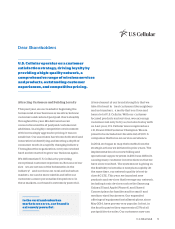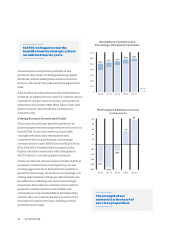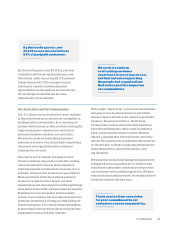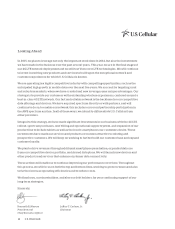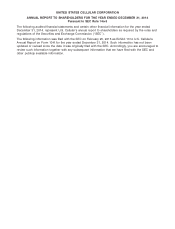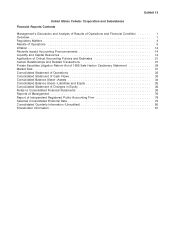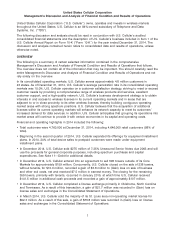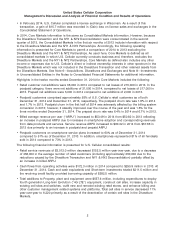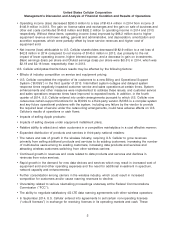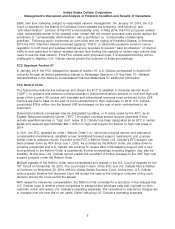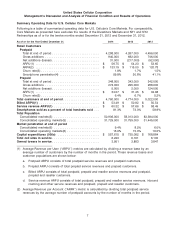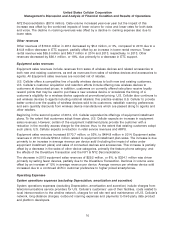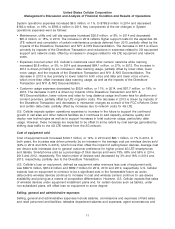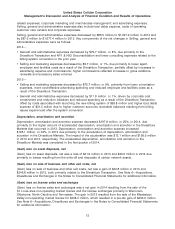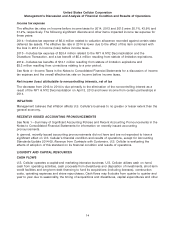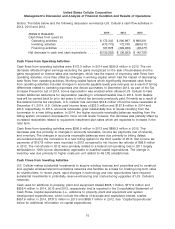US Cellular 2014 Annual Report Download - page 13
Download and view the complete annual report
Please find page 13 of the 2014 US Cellular annual report below. You can navigate through the pages in the report by either clicking on the pages listed below, or by using the keyword search tool below to find specific information within the annual report.United States Cellular Corporation
Management’s Discussion and Analysis of Financial Condition and Results of Operations
traffic over their networks, subject to reasonable network management. On January 14, 2014, the U.S.
Court of Appeals for the District of Columbia Circuit vacated the foregoing ‘‘anti-blocking’’ and
‘‘anti-discrimination’’ portions of the FCC’s net neutrality rules. In May 2014, the FCC proposed revised
rules, substantially similar to the vacated rules, except that the revised proposed rules would replace the
prohibition of ‘‘unreasonable discrimination’’ with a prohibition on ‘‘commercially unreasonable
practices.’’ Following public comments on such rules and the urging of President Obama, in February
2015 the FCC chairman instead proposed applying ‘‘Title II’’ or telecommunications common carrier
regulation to both fixed and wireless internet service providers to prevent ‘‘paid prioritization’’ of internet
traffic to end users and to restrict wireless carriers from limiting the capacity of certain high volume data
users to use the data network. If the FCC adopts such proposed rules, it is expected that they will be
challenged in litigation. U.S. Cellular cannot predict the outcome of these proceedings.
FCC Spectrum Auction 97
In January 2015, the FCC released the results of Auction 97. U.S. Cellular participated in Auction 97
indirectly through its limited partnership interest in Advantage Spectrum L.P. See Note 13—Variable
Interest Entities in the Notes to Consolidated Financial Statements for additional information.
FCC Reform Order
The Telecommunications Act authorizes and directs the FCC to establish a Universal Service Fund
(‘‘USF’’), to preserve and advance universal access to telecommunications services in rural and high-cost
areas of the country. All carriers with interstate and international revenues must contribute to the USF.
Carriers are free to pass on the cost of such contributions to their customers. In 2014, U.S. Cellular
contributed $78.9 million into the federal USF and passed on the cost of such contributions to its
customers.
Telecommunications companies may be designated by states, or in some cases by the FCC, as an
Eligible Telecommunications Carrier (‘‘ETC’’) to receive universal service support payments if they
provide specified services in ‘‘high cost’’ areas. U.S. Cellular has been designated as an ETC in certain
states and received approximately $92.1 million in high cost support for service to high cost areas in
2014.
In 2011, the FCC released an order (‘‘Reform Order’’) to: reform its universal service and intercarrier
compensation mechanisms; establish a new, broadband-focused support mechanism; and propose
further rules to advance reform. Pursuant to the FCC’s Reform Order, U.S. Cellular’s ETC support has
been phased down by 40% since July 1, 2012. As provided by the Reform Order, the phase down is
currently suspended and U.S. Cellular will continue to receive 60% of its baseline support until a new
fund provided in the Reform Order is operational. Further proceedings including litigation may also be
possible. At this time, U.S. Cellular cannot predict the net effect of further changes to the USF high cost
support program under the Reform Order.
Multiple appeals of the Reform Order were consolidated and argued in the U.S. Court of Appeals for the
10th Circuit on November 19, 2013. The court ruled in favor of the FCC and U.S. Cellular filed a Petition
of Certiorari on November 25, 2014 with the United States Supreme Court. At this time, U.S. Cellular
cannot predict whether the Supreme Court will accept the case or the timing or outcome of any such
decision should the Court permit the appeal.
With respect to intercarrier compensation, the Reform Order provides for a reduction in the charges that
U.S. Cellular pays to wireline phone companies to transport and terminate calls that originate on their
networks, which will reduce U.S. Cellular’s operating expenses. The reductions in intercarrier charges are
to increase over the next five to ten years, further reducing U.S. Cellular’s operating expenses.
5


